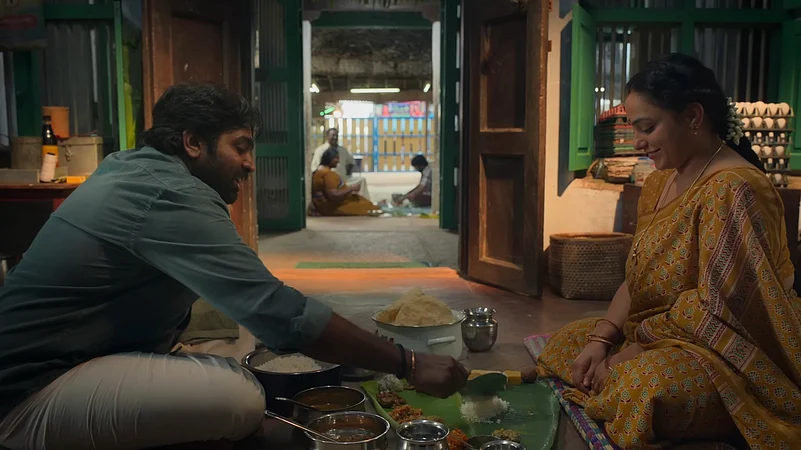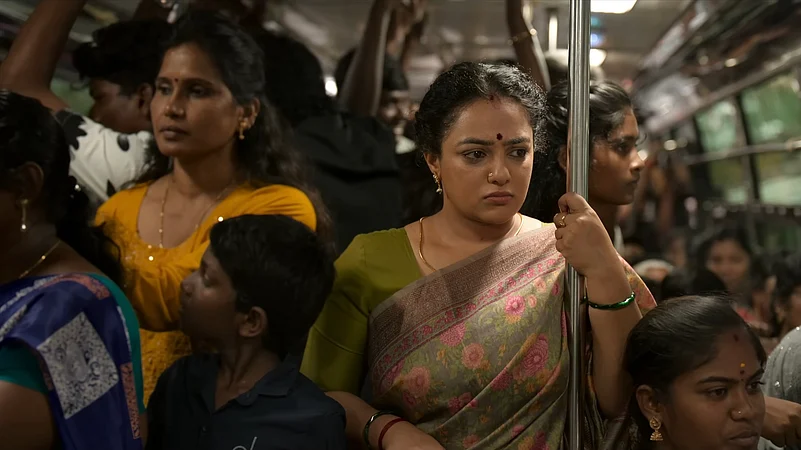Never thought a film could be summed up in three words, yet Thalaivan Thalaivii (2025) fits perfectly as a “Competitive Screaming-Match” between a husband and wife, played by Vijay Sethupathi and Nithya Menen. The film unfolds like a glitch in the matrix, spinning the Enemies to Lovers trope into a chaotic loop where the dynamic shifts constantly, like the shape of water under turbulence. In this Pandiraj-directed film, Sethupathi plays Agasaveeran, a devoted husband to Perarasi (Menen). The catch isn’t that they’re fated to lock horns, but that they remain suspended in a state of constant combustion—ranging from fistfights to knife threats to suicide attempts. The one thing that never leaves the frame is the screaming. When Agasaveeran expresses love, he does so from a cliff, yelling “I love you Perarasi” at full volume—or even at gunpoint. Perarasi isn’t the docile Malayalam heroine archetype either. She’s fiery, tempestuous, and cannot live without throwing her slippers or blows at her husband. Their bond is best described as toxic, addictive, and entirely co-dependent. One could call the film a lovechild of Daawat-E-Ishq (2014) and Pushpa 2 (2024)—a universe where both partners are equally matched in passion, rage, chaos, and volume.
Agasaveeran is a parotta shop owner, revered for his culinary skill. The film opens with the suggestion of a love born from food—he cooks, she relishes. A labour of love rooted in the man who’s proudly a joru ka ghulam. Like Pushpa (Allu Arjun), a feared daredevil who becomes an apologetic loverboy in front of Srivalli (Rashmika Mandanna), Agasaveeran too carries the duality of an “ex-rowdy” trying to lead a new life with his wife. But the film itself spirals into a prolonged argument. Imagine a couple arguing about who loves the other more, dialled up to a hundred. Perarasi, the daughter of ex-gangsters, hides her past until the engagement. He’s fierce, but she’s more so. Their love is kept alive through the cycle of fighting and making up. But the second half collapses into tedium. There’s no new thread after a point, only louder arguments—with each other, their families, their neighbours, even the MLA and a few chaiwalas.

What the film does promise is comedic gold—Sethupathi and Menen have excellent timing and chemistry. The theatre was loud with laughter throughout, the kind that mirrors a Golmaal film’s chaos. Sethupathi is torn between his mother and his wife, playing out the age-old conflict that could easily be solved by moving into a separate home. But the film never offers that obvious solution. He secretly revels in being saved on her phone as “mad fellow,” and follows her around until they reconcile. What follows is a three-hour merry-go-round circling household duties, expectations, and loyalties. Caught in between is their daughter with a half-shaven head (described in the film as a badly cut pineapple). Some scenes are hilariously absurd—like when Agasaveeran tries to drown in a well but is repulsed by the sewage water, or when the daughter mimics Perarasi mid-argument. Still, despite the laughs, the terrain remains troubling. Every toxic trope makes its appearance—domestic violence, suicide threats and emotional blackmail. To add to the absurdity, the film randomly features little floating cartoon characters of the leads, like the ones in Hum Tum (2004), for no particular reason.

You catch the director’s intent early on. Pandiraj aims to portray the madness of a love that refuses to rest—together or apart. The inevitability of their bond is what makes it simultaneously funny and exhausting. The film seems to disregard all paperwork—degrees, divorce certificates, legal bindings. Perarasi saying, “Who can judge legitimacy? I just tore up the paper”, becomes the film’s core philosophy. Bonds don’t end with documentation. They are metaphysical. It embraces every single red flag in a relationship and then coats it with jokes and catchy music.

Yet, it’s impossible to deny how compelling the leads are. Sethupathi and Menen hold the film together, sometimes dragging it along, with their impeccable sync. You stay watching not because the script demands it, but because their presence does. The music also does well to capture fleeting moments of tenderness between the two, reminding us why they’re still together. The film never offers closure. There’s no major resolution. What it does deliver is a string of laughs, though maybe not enough to justify the three-hour runtime. An electric premise, slowly burnt out by repetition. A well-intentioned drama weighed down by its desire to romanticise toxicity.

















